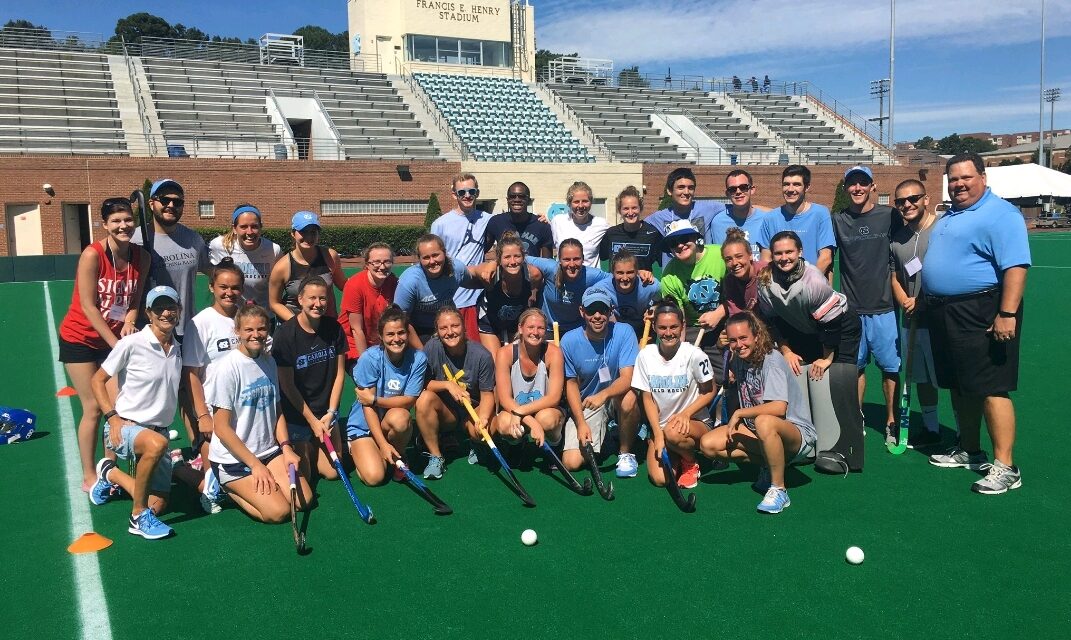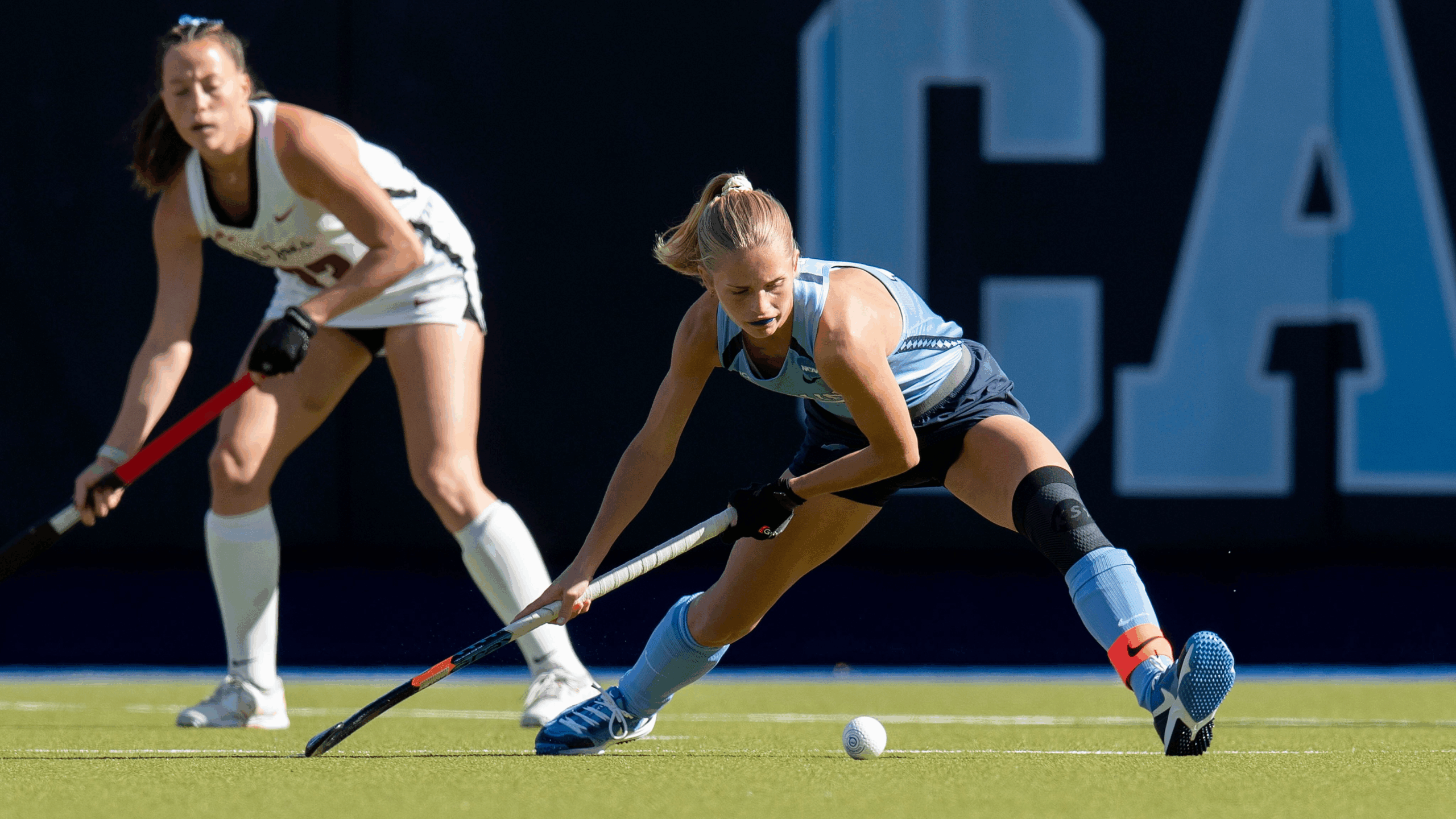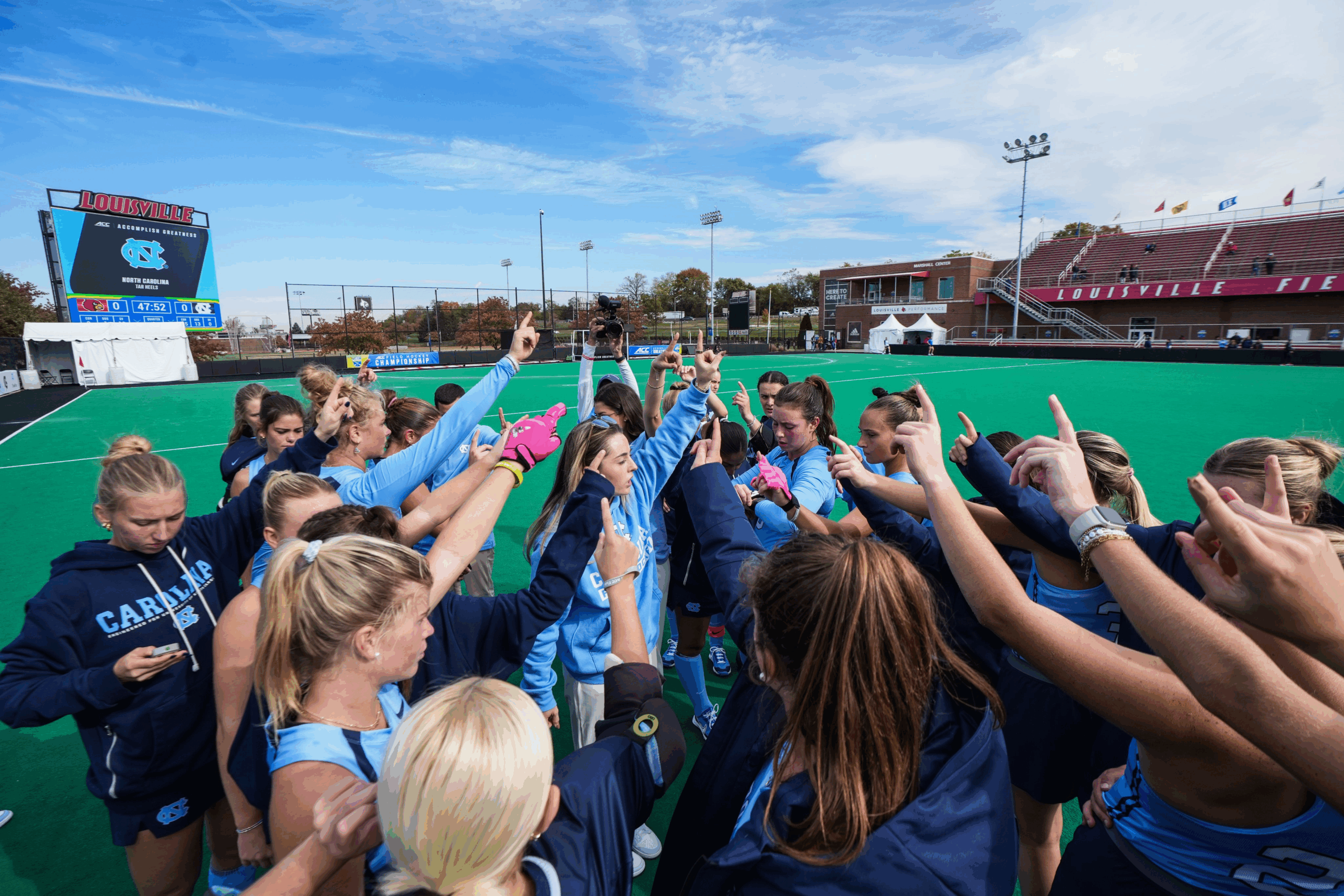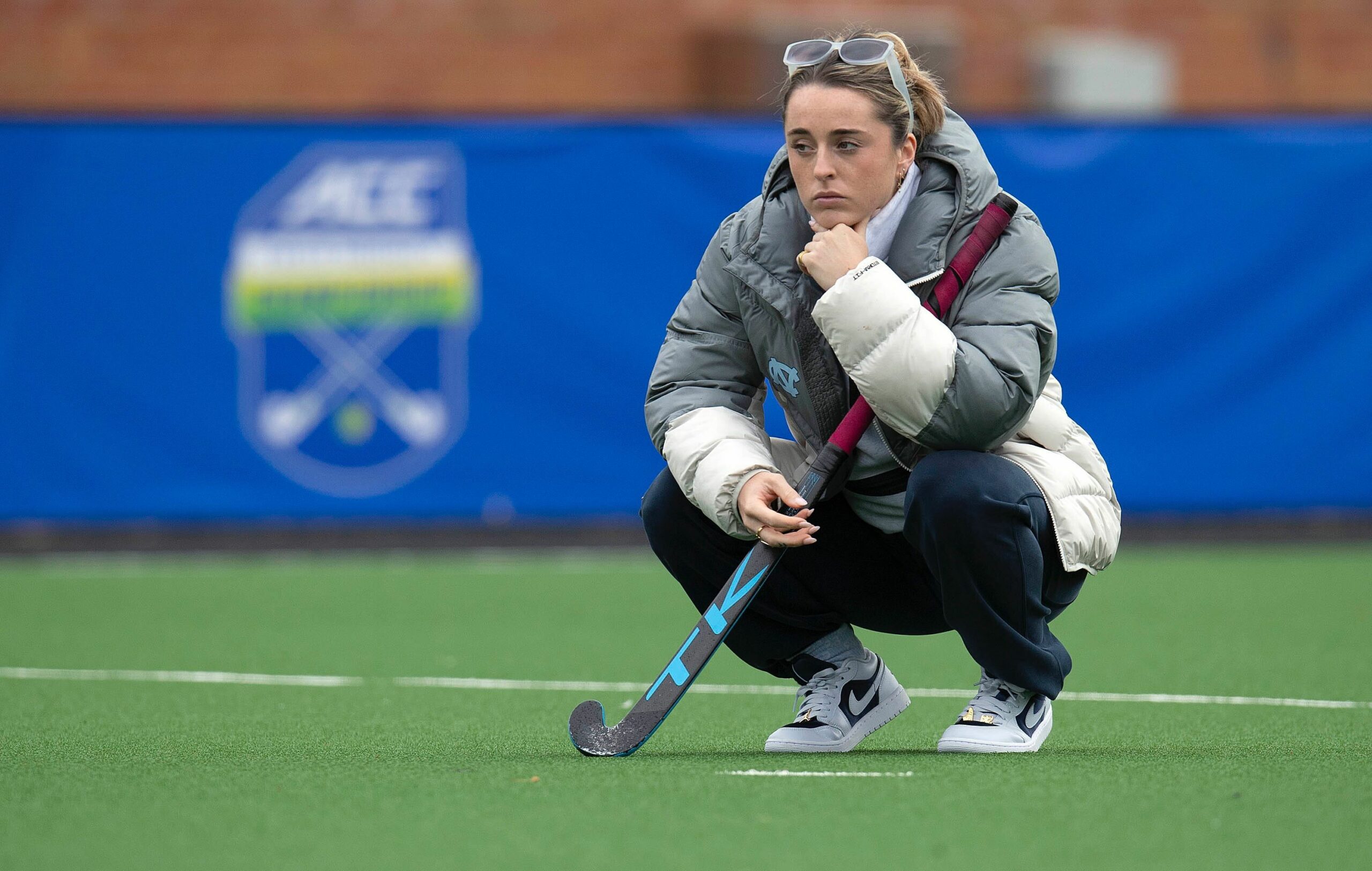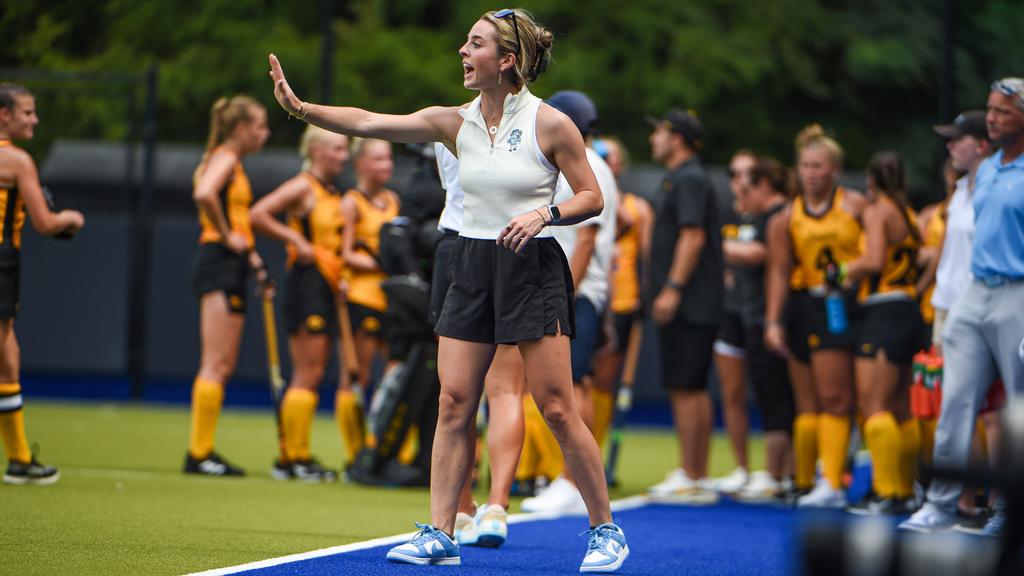When the UNC field hockey team finally returns home after an arduous season-opening road trip, they’ll be greeted by some old friends: the UNC Fockey Band.
What is the Fockey Band? Good question. If you’re a UNC old-timer, you might not recognize this very young brainchild of the band and field hockey programs. It only began in the fall of 2016, and I was a part of this first experimental group.
Entering the fall of 2016, I was a junior in the UNC band program. I had marched two seasons with the Marching Tar Heels and developed friendships with both the band director, Jeffrey Fuchs, and several other members of the band. One morning at rehearsal in August, I noticed that many of these friends were missing. Before I could figure out what was happening, Brian Holtshouser, one of the band’s drum majors for that season, pulled me aside. Brian asked me if I wanted to be a part of the UNC Field Hockey band. It was a new experiment concocted by Fuchs and Karen Shelton, head coach of the field hockey team. I now noticed that many of the band members who’d been absent from rehearsal were now gathering as part of this new group – and I was next in line.
What follows is a series of interviews with members of the original field hockey band, as well as with Fuchs and Shelton. All members of the 2016 Fockey Band were juniors and seniors at UNC that year.
Brian Holtshouser (Tenor saxophone/Director): I can’t remember how I originally heard about it. I think [Fuchs] had a list of people in mind at first, and casually mentioned that I would be the director of it. I saw this as a great opportunity, but also knew it would mean I wasn’t going to do the other Pep Band events anymore. That had some upsides and downsides to it. And I liked the idea of playing all the home games for one team, but I also knew nothing about field hockey.
Jeffrey Fuchs (Director, UNC Bands): Coach Shelton has always wanted the band to be at her games. She appreciates the energy they bring.
Karen Shelton (Head coach, UNC Field Hockey): I think between the two of us, we felt it was important for the team to have this home-field advantage, and how important the band is in creating it.
Jeffrey Fuchs (Director, UNC Bands): And so I came up with the idea of dedicating a group of students. And it was at a time when we had a group of students that I felt like I could sell on this idea, and they would be enthusiastic about it.
Bryce Lapping (Alto saxophone): I distinctly remember my first reaction was, ‘Man, I feel bad for whoever’s gonna have to do that.’ Like, to be frank, I was like, ‘This is a preposterous idea.’
Paul Beam (Trombone): I absolutely loved it. [Fuchs] told us that this band was meant for the most fanatical UNC sports fan, and anybody who has seen me at a UNC sporting event knows I’m a fanatic. I also loved the fact it would be for a sport that, at the time, didn’t get the recognition on campus that it deserved. The sustained excellence that coach Karen Shelton has produced out of that team is truly incredible and is matched by very few. I thought it was a great idea and I was super excited to be a part of it.
Moe Alzer (Alto saxophone): Initially I thought, ‘Why field hockey?’ But then at the same time I was like, ‘You know, maybe it’d be really cool to get involved with a sport that, 1) I’m not familiar with, and then 2) to also have some sort of commitment to an Olympic sport.’ Because when you’re doing these pep band assignments, you only really go to one volleyball game, one women’s basketball game, one soccer game. You don’t really get to see [the teams] go through different competitions unless you’re actively trying to track them.
Megan Frankena (Piccolo): I remember my junior year [2015-16], Fuchs had talked about the possibility of creating individual pep bands for the Olympic sports, and I was somewhat skeptical because I was the type of person who enjoyed going to as many pep band events as humanly possible. But then the next year, Fuchs brought up the idea of Fockey Band, and I was so excited to be a part of it, even though I had no idea what it would entail.
Austin Seamster (Trumpet): [I was] definitely excited because it was something new, but a little anxious because I was used to knowing the rules and strategies for most of the sports I watched. I was completely in the dark about how field hockey worked. Besides that we won a lot, not much.
Bryce Lapping (Alto saxophone): I had attended a few games just as part of the pep band before. I’m kind of a sports junkie, so I Googled the rules and had a basic understanding. But not a great understanding of what was going on. I grew up playing [ice] hockey, so I understood it from a somewhat general perspective, but I didn’t really understand it until showing up for Fockey Band.
Moe Alzer (Alto saxophone): I knew a little bit. I didn’t know a ton. I knew they used sticks. I knew it was more aerobic in terms of the endurance aspect of it. I knew it was sort of a fast-paced sport. It was really similar to soccer, and I love soccer. I knew that the team was good… but that was pretty much it.
Jeffrey Fuchs (Director, UNC Bands): I knew the goal was to get it in the goal. And that was about the extent of my knowledge.
During my initiation to Carolina’s Fockey Band, after arriving at Henry Stadium, Coach Shelton greeted us at the door and walked us into the facility. There, she and the team had prepared a presentation about the rules of field hockey, while providing us food and gear for the upcoming season.
Jeffrey Fuchs (Director, UNC Bands): We came up with that together to invest the kids. The magic [Shelton] brought to it is she was willing to do whatever it took to endear the kids to the field hockey program.
Karen Shelton (Head coach, UNC Field Hockey): It was trying to create more interest in having a group that would want to do our games, not just be assigned our games.
Austin Seamster (Trumpet): I had heard nothing but great things about Coach Shelton, but to actually experience her generous and kind soul was something completely out of this world. She truly made us feel like we were a part of the team, from welcoming us in to learn the rules from the team to providing us bags with bag tags that had our name and ‘Fockey Band’ on them.
Bryce Lapping (Alto saxophone): ‘Field’ plus ‘hockey’ equals ‘Fockey.’
Karen Shelton (Head coach, UNC Field Hockey): I feel bad about the shirts I got them in the past. I got them polo shirts. I didn’t know what I was thinking. I thought it’d be professional… [this year] we’re doing like a tie-dye, I think it’s gonna look a little bit better.
Jeffrey Fuchs (Director, UNC Bands): She committed right away to making that band feel part of her program, and making sure they got shirts, caps, and the players interacted with them. And they were given food and invited to different things. And so it was kind of a joint effort. And the rest, as they say, is history.
Bryce Lapping (Alto saxophone): I think the orientation session was what made me decide, ‘Oh, I’m gonna do it,’ instead of sending another person from our section to do it. I really enjoyed that session.
After that, we were invited onto the field to hit around with the players themselves.
Karen Shelton (Head coach, UNC Field Hockey): It’s fun to see the students interact together. That in itself is something that is interesting, and I think useful. And I think the education behind the session was important as well. So there’s a little bit more buy-in, to have students mingling with students, and having respect for the game itself.
Austin Seamster (Trumpet): I thought it was going to be easy. Like, who wouldn’t be able to hit the ball with that stick? I couldn’t have been more wrong.
Jeffrey Fuchs (Director, UNC Bands): Watching the band kids try to dribble, and even just hit the ball, was hilarious.
Austin Seamster (Trumpet): I might have made contact with the ball once after a few attempts.
Moe Alzer (Alto saxophone): Oh my goodness, the amount of technical skill that you need, it gave me an appreciation for what they did. Because I was just like, ‘This is so hard to try to get down.’ But it was cool, it was really cool, it was a really chill thing to have.
Bryce Lapping (Alto saxophone): It was definitely humbling to go out there and feel like, ‘OK, I’ve got some good stick handling skills with a puck.’ And then to go out there with the field hockey ball and a whole different type of stick, I felt very much like a kindergarten-level field hockey player.
Karen Shelton (Head coach, UNC Field Hockey): I think our kids, at times, make it look easy. And we know the game’s not easy. The fundamental skills are difficult, and take years and years to perfect. And so when you see our kids out on the field, it looks like they were born doing it. And so to have band students pick up the stick and realize that it’s not such an easy thing to shoot on goal, or to receive the ball, in the proper manner… that’s always been important. That there’s an appreciation for the difficulty of what it is we’re trying to do.
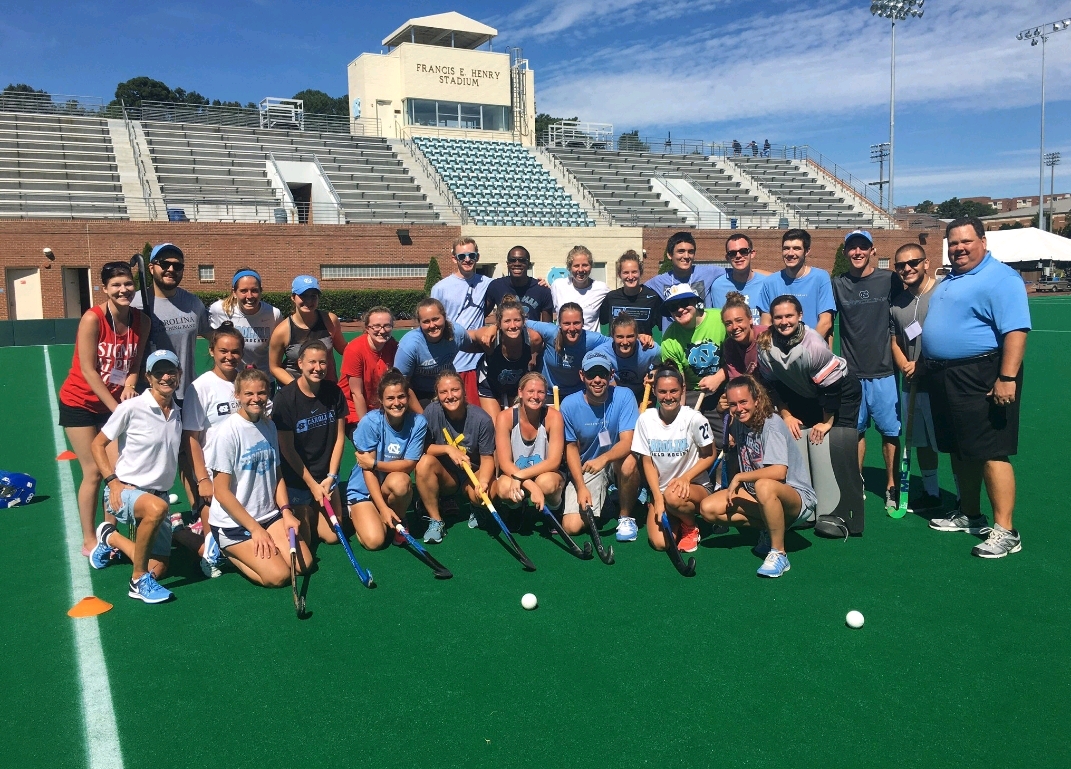
The UNC Fockey Band with the Field Hockey team in 2016. (Image via UNC Field Hockey)
Moe Alzer (Alto saxophone): One of the things I loved about the players is that they weren’t super egotistical. They were really open, and they were also really excited to have us. It’s really hard to gauge the attitude of these athletes when we’re playing in band, because you just don’t know whether they like having us there, whether they even think about us at all or are appreciative of us. I’m sure they are, but when you have that close of an interaction with the athletes, it makes what you do that much easier. You know that they want you there. You know that they love your support.
Megan Frankena (Piccolo): One of the things that had always stood out to me about the field hockey team was that they seemed to truly enjoy having the band there for them. Players, staff and parents would thank us for coming, they would interact with the band, and never ran off the field before singing Hark the Sound with us. So I knew Fockey Band was going to be worth it.
The Fockey Band was a smaller group than most Pep Bands, with only 15 people involved. The band played at every home game for the team, and consistently tried to bring up the energy level in the crowd.
Bryce Lapping (Alto saxophone): It was a lot more fun that year, knowing the rules to the game. Before, it was, ‘Huh. What are they doing?’
Austin Seamster (Trumpet): The games were always great! It wasn’t the biggest crowd, but it was impactful because the people that were there were invested in the game. Like the parents. And I’ll never forget how before the game we would always walk over to the Boshamer lot where a lot of the parents parked and play for them before the game. It’s those little things that I’ll remember the most.
Moe Alzer (Alto saxophone): I would say, ‘Small, but mighty,’ in terms of the energy we tried to bring. One of the things, especially with sports, is that you want to make sure you have a really great home crowd. Because it just gives you that extra boost you need. It feels so good to play at home. It was just nice to know that they could rely on us to give them that extra push they needed.
Paul Beam (Trombone): If the stands weren’t full, we were going to do our best to make it feel like they were, so we could create that home-field advantage that we know the other teams had never truly experienced before. When you have a group as ravenous and borderline obnoxious as we could be, it could really mess with the other team. One time, I think we were playing Virginia, and during their penalty corners we would play and then yell ridiculous things at them. It was nothing obscene, but just annoying like, “Hey #7 your shoe is untied! No seriously, look down!” It seemed pretty harmless, but they were so unnerved by what we were doing to them they complained to the ref and tried to get us to stop! That kind of stuff seems small, but in a tight game emotions can be the difference between winning and losing, and I’m really proud that we could provide that little extra edge.
Bryce Lapping (Alto saxophone): I think there’s a certain level of understanding the game. You know, basketball is really easy to follow. Football is really easy to follow. You don’t really need to know what the fouls are, you just know that they’re fouls. In field hockey, there are so many fouls, but the game doesn’t stop when there’s a foul. So, the fact that you have 15 people who are solely dedicated to knowing the rules of field hockey, knowing when they’re supposed to play, knowing what’s going on in the game, when they’re supposed to chant, it makes a big difference.
Karen Shelton (Head coach, UNC Field Hockey): I can tell the difference, and I think the kids can as well.
Brian Holtshouser (Tenor saxophone/Director): We knew their names! We could cheer on members specifically, and they could probably hear us sometimes, too. They may not know all our names, but we felt a lot closer to them than any other team we played for.
Moe Alzer (Alto saxophone): You can have a small group of people that really, really care about what they’re doing be way better than a bigger group where everybody’s giving 75 percent. I think it being so small-knit, and picking the group of players that we did for that band, was able to drive the energy up for that.
Megan Frankena (Piccolo): Being a smaller band definitely helped us connect not only with each other, but with the team. The team knew they could count on us to show up. We also all held each other to high standards within the pep band. I remember when someone had to miss a game and find a sub, you could just tell the vibe was different because the original group just clicked so well with one another.
Austin Seamster (Trumpet): I think it allowed us all to grow really close.
During the course of the season, the small Fockey Band developed a few traditions for every game. In particular, the Fockey Band began referring to the match official as “Steph the Ref.”
Paul Beam (Trombone): Oh man, Steph the Ref was a great one. I remember we’d also simulate the conversations [between] Steph and whoever the other ref was, and none of them caught on or was as hotly-contested as where they were going to dinner that night, Applebee’s or Chili’s. Chili’s all the way for me.
Austin Seamster (Trumpet): I just remember one person would start something, and if it stuck, it stuck.
Brian Holtshouser (Tenor saxophone/Director): We liked the opportunity to throw t-shirts out to the crowd when we scored. That’s not something we did at any other Pep Band events.
Moe Alzer (Alto saxophone): One of the things I did like was going down for the [pregame] tunnel. We didn’t do that with any other Olympic sports. I think [the team] really loved that. That was one thing I remember I loved doing.
Austin Seamster (Trumpet): Probably the greatest tradition, and not that it was unique to us, was how the team came over after every game and sung Hark [the Sound] as we played it.
One memorable Fockey Band event was the 2016 ACC Championship Game, played on the campus of Wake Forest University in Winston-Salem, about a 90-minute drive from Chapel Hill. Bands were not allowed to play at the event, but several members of the Fockey Band made the trip anyway, making as much noise as they could for the Tar Heels and often yelling the fight songs instead of playing them.
Bryce Lapping (Alto saxophone): I think that showed something. We had to pay our own dime to go. And we had to drive ourselves. And, the crazy thing about the whole thing, is that we cared whether or not the team won.
Brian Holtshouser (Tenor saxophone/Director): No other team in the ACC had their own Fockey Band, so they wouldn’t allow us [to play]. I think that was mostly Paul leading those [chants], making us as loud as we could. At least I think it was Paul. Sounds like Paul.
Paul Beam (Trombone): Oh, this was so much fun. It’s truly what the college student fan experience is all about. Piling into a few cars with your friends and caravanning down the road to see your favorite team play. We could also tell the players, Coach Shelton and the UNC fans in general really appreciated our commitment to cheering them on. It’s one of my favorite memories of being a student at UNC.
Megan Frankena (Piccolo): The thing about band kids is that we don’t have to have our instruments to be the loudest people in the stands. It’s important to show our student-athletes they matter to us. So when we got to unofficially travel to Wake, we knew we were going to be heard.
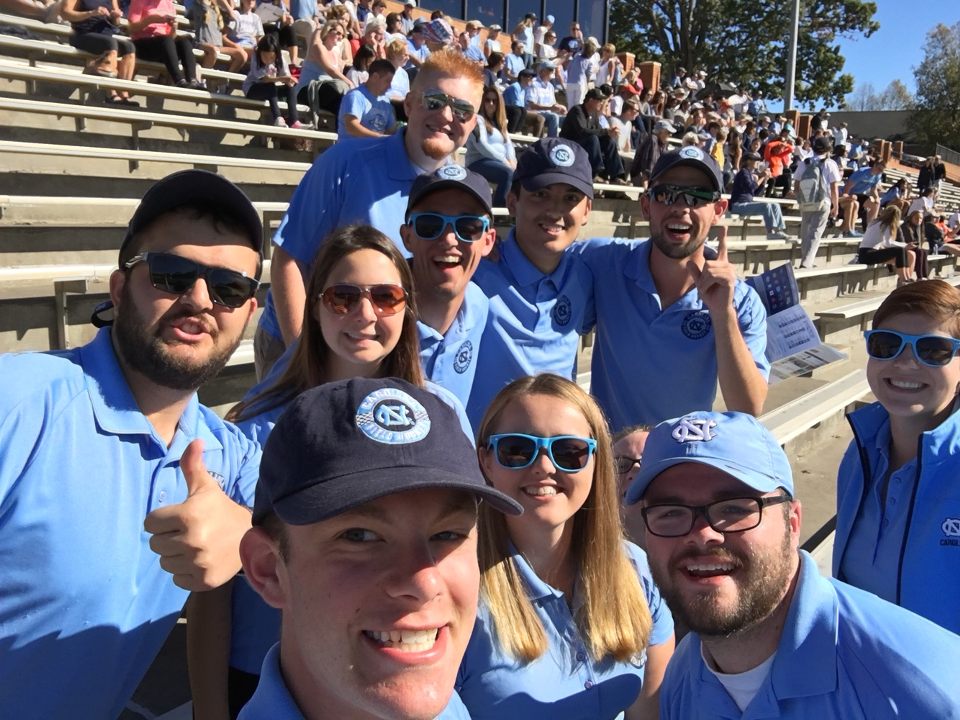
Members of the UNC Fockey Band cheering on the Tar Heels in Winston-Salem. Bottom row (L-R): Adam Sheinhaus, Megan Frankena, Paul Beam, Megan Willis. Middle row (L-R): Brian Holtshouser, Lauren Harrold, Bryce Lapping, Michael Koh, Austin Seamster. Top row: Maverick Hart. (Image via Adam Sheinhaus)
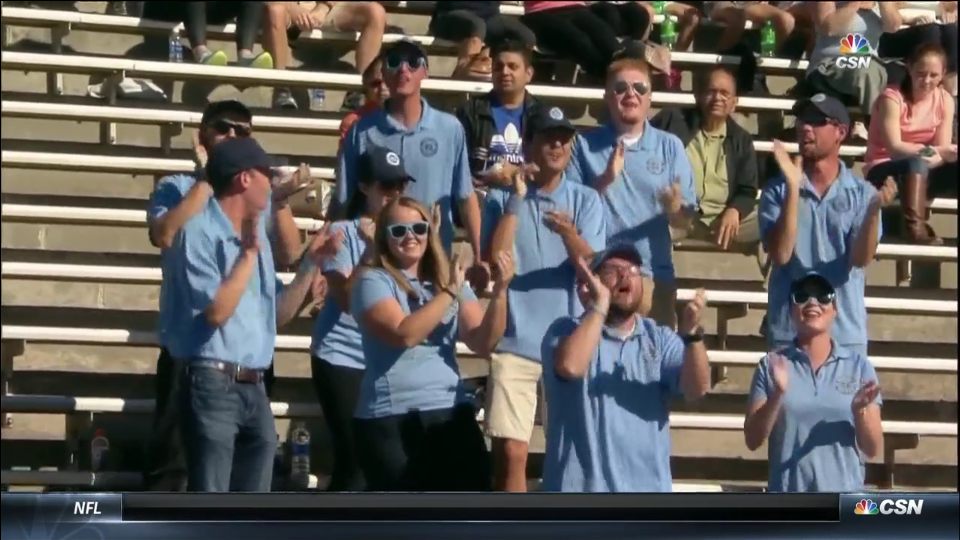
The Fockey Band even got noticed by TV cameras at the game. (Image via Megan Frankena)
All members of the 2016 Fockey Band have graduated from Carolina, but the new band still plans to play at home field hockey games this year. Much has changed around the field hockey program, however. For example, the team has won three additional national championships. Henry Stadium is gone, its demolition part of an extensive renovation of the university’s athletic facilities. The field hockey team now plays in Karen Shelton Stadium, a state-of-the-art facility opened in 2018. Within that same time frame, the Fockey Band has grown into one of the more popular groups within the UNC band program, with more students volunteering for the group than can be taken.
Jeffrey Fuchs (Director, UNC Bands): We have to pick now. In fact, we’ve expanded the band to twenty [members]. But yeah, now we have to tell people that they can’t be part of Fockey Band.
Paul Beam (Trombone): It’s incredible to see. It’s something that is completely unique to UNC, and it feels so good to know that I helped build the foundation for it.
Bryce Lapping (Alto saxophone): I think it’s hilarious. Because, just the concept of there being a Fockey Band is… at the surface, it’s funny. Like, this is a thing that exists. But as a Fockey Band alumnus, it’s really special to see that it’s something that I was a part of, the first couple, that really made it something worth doing. As an alumnus of UNC, as an alumnus of the Fockey Band, it makes my heart soar.
Moe Alzer (Alto saxophone): Any time you can make a lasting impact like that, it makes you feel really special. We sort of catalyzed what it was for years to come. We showed other members of the band, especially the younger ones. Because we were upperclassmen who were in there, and some of the younger people were like, ‘Man, this looks like a lot of fun.’ And we were telling them, ‘Hell yeah this is a ton of fun!’ For us, it was like a third primetime sport [with football and men’s basketball], something we were all really excited to do. I’m not surprised that it’s a hot commodity around the band now.
Karen Shelton (Head coach, UNC Field Hockey): I’m glad that anybody feels pride that they were in that Fockey Band, and [knows] how much we appreciate them and what it means to our program.
2016 Fockey Band Members
Megan Frankena (Piccolo), Nikki Newman (Piccolo), Megan Willis (Clarinet), David Michaud (Clarinet), Bryce Lapping (Alto saxophone), Moe Alzer (Alto saxophone), Brian Holtshouser (Tenor saxophone/Director), Maverick Hart (Trumpet), Austin Seamster (Trumpet), Michael Koh (Mellophone), Adam Sheinhaus (Baritone), Paul Beam (Trombone), Jamal Rogers (Trombone), Isaac Weber (Sousaphone), Lauren Harrold (Percussion)
Chapelboro.com does not charge subscription fees. You can support local journalism and our mission to serve the community. Contribute today – every single dollar matters.

